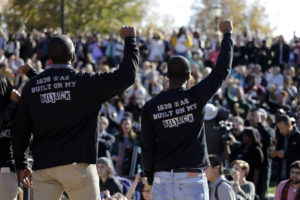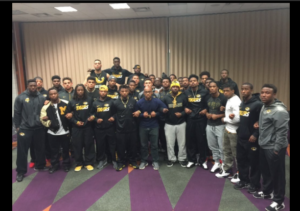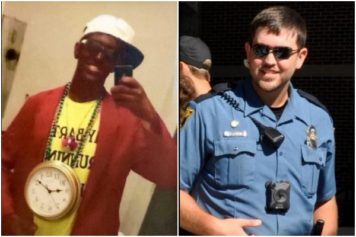
Members of the black student protest group, Concerned Student 1950, raise their arms while addressing a crowd following the announcement University of Missouri System President Tim Wolfe would resign Monday, Nov. 9, 2015, at the University of Missouri in Columbia, Mo. (AP Photo/Jeff Roberson)
Why did Tim Wolfe, the president of the University of Missouri system, resign from his position? One can assume it was due to his failure to deal with the rampant racism on campus, the hostile environment for Black students, and the white supremacist climate that apparently was allowed to thrive at the institution.
Yet, racism has been a longstanding, unaddressed issue for years at Mizzou. Ultimately, this time, it was all about the dollars. Money is the one thing that white America values, and the only thing that matters in this Anglo-Saxon brand of capitalism. The leveraging of financial power by the striking Black football players was the ultimate tipping point. By getting to the bottom line, these students provide a template for other protesters accomplish what they will more efficiently, and in a shorter period of time.
Writing in The Atlantic, Adrienne Green provides some things to consider. For example, there were 32 football players who lent their support to hunger striker Jonathan Butler, and refused to play until Wolfe resigned. College football is lucrative with much money on the table, and that is certainly the case for the Missouri Tigers, which generated over $14.2 million last year. Further, as Green pointed out, the coach recently received a raise from$3.1 million to $4 million, while Wolfe made a mere $459,000 annual salary—which is not inconsequential, but indicative of the priorities of the university.

Black University of Missouri football players pledged they would not play until President Tim Wolfe resigned.
This coming Saturday, Missouri is scheduled to play Brigham Young University. Under the contract, Missouri pays BYU, the visiting team, a visitor fee of $250,000. However, in the event of a game forfeiture, which was about to happen, Missouri would have to pay its opponent $1 million for each game it cancelled. Of course, this does not include TV deals, concessions and other business arrangements that depend on the games taking place.
While only 7 percent of the university is Black, nearly half of the football team (60 of 124 players) is Black. Green indicated that in the past, white athletic directors were able to keep Black athletes separated from the issues affecting the greater college community and other Black students. This time was different, and one of those rare occasions when student protesters were able to bring a college to its financial knees. When the #ConcernedStudent1950 protesters disrupted their university’s homecoming parade last month and blocked Wolfe’s car, they were met with ridicule and the police force. But now they are triumphant, even if they still have yet to see their other demands met.
Perhaps the following tweet sums this moment up best:
#Mizzou lessons: (1) leverage what you can to make people do what they don’t want to do; (2) it doesn’t matter why they do it if they do it.
— Gretchen (@Gretchen_H_K) November 9, 2015
The power of college athletics may very well be a lamentable and regrettable state of affairs, but it is a reality nonetheless upon which Black student activists were able to capitalize. State schools in particular place their resources in sports, which becomes the center of college life. Student athletes are viewed as heroes who generate great wealth for these institutions. However, if Black student athletes are not aware of their self-worth and potential power as leaders and influencers, they risk becoming merely high-priced slaves, at best mascots, or gladiators playing in the arena and getting crushed at the behest of the emperor. And in any case, when the police stop them on the road for driving while Black, there is little to no concern over how many touchdowns they scored in the big game.
Calling Black students ni***rs does not necessarily lead to action by white authority figures, nor does scrawling racist graffiti on campus buildings or littering a Black culture student center with cotton do the trick. Not even a Black man nearly dying of starvation may be sufficient, in a nation that is accustomed to the wholesale death of Black men. Perhaps not even a swastika made of feces will cause them to succumb to pressure. But a million bucks a game certainly will change things, in which case we will take the wins wherever and whenever we can.


